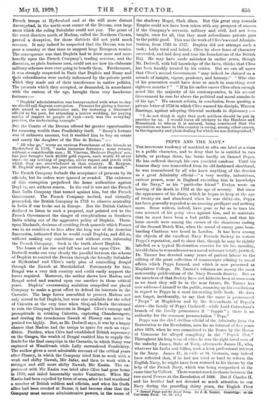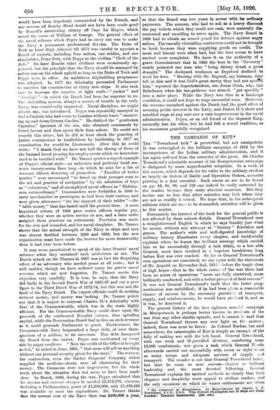PEPYS AND THE NAVY.*
Tfra inveterate tendency of mankind to affix one label at a time to a public character, and to deny that he is entitled to two labels, or perhaps three, has borne hardly on Samuel Pepys. He has suffered through his own youthful candour. Until his famous diary was transcribed from its old-fashioned shorthand, he was remembered by all who knew anything of the Service as a great Admiralty official—" a very worthy, industrious, curious person, none in England exceeding him in knowledge of the Navy," as his "particular friend" Evelyn wrote on hearing of his death in 1703 at the age of seventy. But since the appearance of his diary, which he began to keep at the age of twenty-six and abandoned when he was thirty-six, Popys has been generally regarded as an amusing profligate and nothing more. Some writers, indeed, have gone so far as to turn his own account of his petty vices against him, and to maintain that he must have been a bad public servant, and that his loose morals were among the causes of the disastrous ending of the Second Dutch War, when the sound of enemy guns bom- barding Chatham was heard in London. It has been among the objects of the excellent Navy Records Society to restore Pepys's reputation, and to show that, though he may be rightly labelled as a typical Restoration courtier for his lax morality, his old claim to remembrance as a naval reformer is fully justified. Dr. Tanner has devoted many years of patient labour to the editing of the great collection of manuscripts relating to naval affairs which Pepys formed, and which is now preserved at Magdalene College. Dr. Tanner's volumes are among the most noteworthy publications of the Navy Records Society. But as the members of that Society have not hitherto been as numerous as we trust they will be in the near future, Dr. Tanner has now addressed himself to the public, summing up his conclusions in regard to Pepys in a most interesting little book. Ho does not forget, incidentally, to say that the name is pronounced " Peeps " at Magdalene and by the descendants of Pepys's sister—the family of Pepys Cockerell—while Lord Cottenhatn's branch of the family pronounces it " Poppis " ; there is no authority for the common pronunciation "Peps."
Pepys was the chief civilian official of the Admiralty from the Restoration to the Revolution, save for an interval of five years after 1679, when he was committed to the Tower by the House of Commons for alleged complicity in the "Popish Plot." Throughout his long term of office he was the right-hand man of the unlucky James, Duke of York, afterwards James II., who, whatever his faults and follies, took a keen professional interest in the Navy. James IL, in exile at St. Germain, may indeed have reflected that, if he had not tried so hard to reform the English Navy, he might have been restored to his throne by the help of the French Navy, which was being reorganized at the
same time by Colbert. There was not much to choose between the two naval Powers at the Revolution of 1688. But if Charles H. and his brother had not devoted so much attention to our Navy during the preceding thirty years, the English Fleet • Samuel Peppy and the Royal Navy. By J. IL Tanner. Cambridge : at the University Press. I Os. ed. net.J
would have been hopelessly outmatched by the French, and our reverse off Beaohy Head would not have been made good by Russell's astonishing victory off Cape La Hogue, which saved the cause of William of Orange. The general effect of the naval reforms which Pepys had to carry out was to make the Navy a permanent professional Service. The Duke of York as Lord High Admiral till 1673 was careful to appoint a Board of experts, including four sailors, one soldier, and one shipbuilder, Peter Pett, with Pepys as the civilian "Clerk of the Arts." On later Boards other civilians were occasionally ap- pointed, but the principle that the Navy should be managed by sailors was on the whole upheld so long as the Duke of York and Pepys were in office. An ambitious shipbuilding programme was adopted. In 1677 the Admiralty persuaded Parliament to sanction the construction of thirty new ships. It also took care to increase the number of light craft—" yachts" and " fireships "—in which the Dutch had been far superior to us. The victualling system, always a source of trouble in the early Navy, was considerably improved. Naval discipline, we might almost say, was introduced. Pepys was repeatedly annoyed to find a Captain who had come to London without leave "saunter- ing up and down Covent Garden." He disliked the "gentlemen Captains," ignorant of the sea, who obtained commands by Court favour and then spent their time ashore. He could not remedy this abuse, but he did at least cheek the granting of jtmior commissions to landlubbers by instituting in 1677 an examination for would-be Lieutenants. After this he could write : "I thank God we have not half the throng of those of the bastard breed pressing for employments which we heretofore used to be troubled with." Dr. Tanner quotes a superb example of Pepys's official style—an unbroken and perfectly lucid sen- tence twenty-seven lines long—in which he asks for a list of warrant officers deserving of promotion. "Families of better quality" were encouraged "to breed up their younger sons to the art and practice of navigation" by the admission of boys as "volunteers," and of unemployed naval officers as "Midship- men extraordinary." Commanders were forbidden in 1686 to carry merchandise or passengers, as had been their custom, and wore given allowances "for the support of their tables "—the "table money" that has lasted until the present time. A most Important reform of 1668 gave senior officers regular pay, whether they were on active service or not, and a later order assigned them pensions on retirement. Provision was made for the sick and wounded, and for naval chaplains. Dr. Tanner shows that the actual strength of the Navy in ships and men was almost doubled between 1660 and 1688, but the new organization must have made the Service far more trustworthy than it had ever been before.
It may seem paradoxical to speak of the later Stuarts' naval reforms when they sustained such misfortune at sea. The Dutch attack on the Thames in 1667 was in fact the despairing effort of an adversary who needed peace at all costs ; but it still rankles, though we have suffered many far graver naval reverses which are now forgotten. Dr. Tanner meets this objection very candidly. It is true, he says, that the Navy did badly in the Second Dutch War of 1665-67 and cut a poor figure in the Third Dutch War of 1672-74, but this was not the fault of the Navy Board. The expert officials could do nothing without money, and money was lacking. Dr. Tanner points out that it is unjust to contrast Charles ll.'s Admiralty with that of the Commonwealth, which was in the main highly efficient. For the Commonwealth Navy could draw upon the proceeds of the confiscated Royalist estates, thus spending capital, while the Restoration Board had to live on such revenue as it could persuade Parliament to grant. Furthermore, the Commonwealth Navy bequeathed a large debt, of over three- quarters of a million, to its successor. This debt hampered the Board from the outset. Pepys was confronted on every side by angry creditors. "Now the credit of the Office is brought so low," he noted in June, 1661, "that none will sell us anything without our personal security given for the same." The seamen, the contractors, even the Barber Surgeons' Company which supplied the medicine-chests, were all clamouring for their money. The Commons were not ungenerous, but the whole truth about the situation does not seem to have been made dear. In March, 1666, during the war, Pepys calculated that for arrears and current charges he needed £2,312,876, whereas, Including a Parliamentary grant of £1,250,000, only £1,498,483 was available to meet the expenditure. Dr. Tanner thinks that the normal cost of the Nays, then was £400,000 a year, so that the Board was two years in arrear with fin ordinary payments. The seamen, who had to sell at a heavy discount the pay tickets which they could not cash, were naturally die.. contented and unwilling to serve again. The Navy Board in 1666 had to obtain an armed guard for defence against angry sailors. The rascally victualling contractors could not be brought to book because they were supplying goods on credit. The meat and biscuit were often bad, but the beer seems to have excited most complaint. We have it on the authority of a grave Commissioner that in 1665 the beer in the ` Coventry ' nearly poisoned one man who "being thirsty drank a great draught." The dockyard workmen at Deptford declined to work for love. "Meeting with Mr. Bagwell, my foreman, they fell on him and it was God's great mercy they had not spoilt(' him," reported the Superintendent, one Jonas Shish, who, like Rehoboam when his tax-gatherer was stoned, "gat speedily" into a safer place. While the Navy was thus in a bankrupt condition, it could not hope to wage successful wars. However, the reverses sustained against the Dutch had the good effect of arousing public interest in the Navy, and James IL's short and troubled reign at any rate saw a vast improvement in the naval administration. Pepys, as an old friend of the deposed King, naturally lost his office, but he had left a sound tradition, as his successors gratefully recognized.











































 Previous page
Previous page